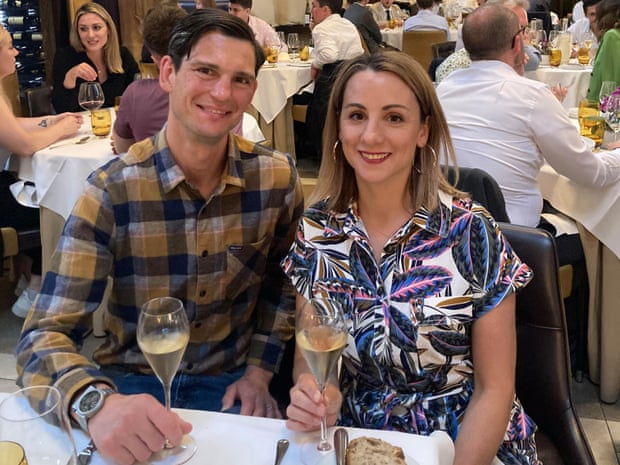
In adoption circles, it’s known as “coming out of the fog”. “What that means,” says Claire Moruzzi, 42, a copywriter from London, “is the realisation that you were affected by being adopted. The accepted narrative is that adoption is a positive thing, and you didn’t lose anything, only gained.”
The process is different for everyone, she says, but often it happens after adopted people become parents themselves. This was the case for Moruzzi, who was adopted at two weeks old. She came out of the fog in 2013, when she gave birth to her son. “I didn’t understand why I felt so sad when I had my baby,” she says. She developed postnatal depression, and her GP referred her for counselling.
“I suspected it was partly to do with not having dealt with my feelings around being adopted,” says Moruzzi. “Before I had the baby, I’d never really examined how I felt.” The feelings intensified when she had her daughter in 2015. “I became conscious that I was part of a lineage of women,” says Moruzzi, “and I didn’t know anything about them.”
Moruzzi looked in vain for resources for adult adoptees, so set up How To Be Adopted, a website offering a supportive community for adult adoptees, where posters share advice and experiences.
Moruzzi also runs a monthly support group in north London. “It’s a place,” she says, “where you can share things without always having to say: ‘I love my family and I’m happy’, or explain why you might be curious to meet someone who looks like you, or find out more about your grandmothers.”
“Claire has worked selflessly to support hundreds of adoptees,” says fellow volunteer Gilli Bruce. “I joined her a couple of years ago, adding some small contributions, but Claire has done all the donkey work and gone unrecognised for too long.”
Adult adoptees, says Moruzzi, often “struggle with relationships, friendships and reunions. People reach out to their birth relatives and get cold-shouldered and ghosted.” Adult adoptees may struggle with addiction, people pleasing or identity. When they talk about being adopted to others, the questioning can be insensitive: “People say: ‘Why are you bothering? You’ve got your family. Why do you need to dig up the past?’.”
Now that ancestry tests are so popular, Moruzzi finds this bewildering. Adoptees “have to pretend biology doesn’t matter to us. Other people can go on Ancestry.com and do their family tree. Why is it one rule for us and another rule for others?”
When she met her biological relatives in her 20s, it was a positive experience, but Moruzzi thinks this may have been in part because “I was in the fog. I was desperate to be accepted and be considerate about existing dynamics.” This, she says, is common. “A lot of us overmanage and overthink this stage. We write letters saying, ‘I don’t want to bother you’, when we haven’t done anything wrong.”
Another common issue is medical records. Most adoptees do not know their medical history. “We live in a world that isn’t the most friendly to adopted people,” says Moruzzi. “A GP will ask if you have a family history of a certain disease, and you have to explain that you don’t know. All of that info has been legally severed from you and your children.”
To make matters worse, all therapists providing adoption-related counselling to adopted people – even adults – must be Ofsted-registered. This arcane regulation makes it difficult for adult adoptees to find help. “Not everyone can be registered,” Moruzzi says. “Counsellors often have to turn people away.” The Adoption Support Fund pays for therapy for adults up to 25, but after that “it drops off a cliff. That’s why we’ve built our own community – to support each other and have a safe space.”
Some of the people who attend Moruzzi’s group haven’t disclosed their adopted status to friends or partners. “They say they never felt understood, or seen, or like they belong,” she says. “Being able to meet people in the same boat and speak without judgment is powerful. There are people out there who may wait decades before they talk.”
When it comes to her treat, Moruzzi tells me she has never been for a Michelin-starred meal, so Galvin La Chapelle in the City of London invites her and her husband Dan for a seven-course tasting menu. “It’s the service,” Moruzzi enthuses. “You can really tell the difference from a normal restaurant.”
Sign up to our Inside Saturday newsletter for an exclusive behind the scenes look at the making of the magazine’s biggest features, as well as a curated list of our weekly highlights
Really the night was as much a treat for Dan. “I couldn’t do any of it without him,” she says. “Both emotionally and practically. It’s not what he would have chosen, but he’s really proud of me. When I started the blog, I just wanted to help one person.
“He always teases me about that. He says: ‘I thought it was just one!’”
Want to nominate someone for Guardian angel? Email us – with their permission – and suggest a treat at [email protected]



